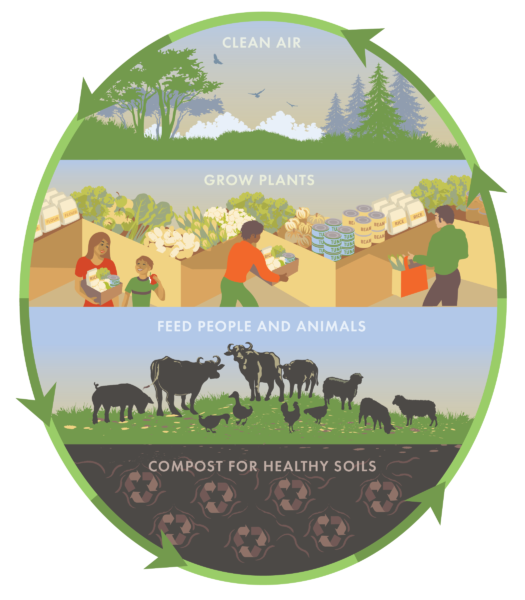Carbon is the fourth most abundant element in the universe, and it can be found everywhere: in rocks, ocean, the atmosphere, soil, and living things. There is a balance in the way that carbon cycles through these different forms, and climate change is happening because there is more carbon released into the atmosphere than is getting stored in the ground. We can minimize our impact on the climate by not only reducing carbon emissions, but also by increasing carbon sequestration (the capture and long-term storage of carbon) through the use of compost. Learn more at: https://climate.nasa.gov/evidence
Related topics:
Compost giveaways for residents
Compost rebate
SB 1383 Short-Lived Climate Pollutants Law
In the atmosphere, carbon is found mostly in the form of carbon dioxide and methane, which act like blankets for the Earth. However, methane is 86 times better at trapping heat than carbon dioxide over 20 years. Composting organic materials like yard debris and food scraps prevents them from going into the landfill where the lack of oxygen causes methane to form.
Plants use the sun’s heat to convert carbon dioxide into sugars and wood. Putting compost on soil gives more nutrients to the plant and so helps it grow faster and bigger. The larger the plant, the more carbon is taken out of the atmosphere—this is called carbon sequestration.
When plants grow bigger, more food is produced. People and animals digest the sugars in plants and exhale carbon dioxide into the atmosphere. Although we must decrease carbon emissions and increase carbon sequestration to slow climate change, some carbon dioxide is necessary for plants to grow.
In addition to sequestering carbon and providing more nutrients to plants, compost increases aeration, water holding capacity, and biodiversity in the soil. This decreases the need for chemical fertilizers and pesticides. The carbon that is not converted into sugar or wood is stored in the soil.

Find options to donate your perishable and non-perishable food to feed people.
Find options to donate produce or food that is unfit for human consumption and that may be fed to livestock.
See what kinds of organics, including food scraps, in are accepted in your yard debris cart.